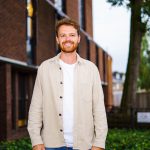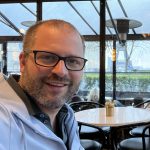Kettingbrief
Verhaallijn 1 31-12-2023
editie 4 | jaargang 11
What has your career been like so far?
After completing my bachelor, I had the feeling that on paper I ‘knew’ how companies work, but besides my BEP I had barely seen anything in practice. For that reason, I took a gap year, where I worked both at a publishing house and at the Young Advisory group, a student consultancy where you both run the company and perform the projects, a combination that really spoke to me!
After that year, I started with my master OML and joined the honours academy. For the latter, I had to find a project. I got together a team and we worked on creating our own start-up that would allow students to buy a room instead of rent it. Although with the current market, the idea was financially not feasible, I learned a lot and I think it is cool how the TU/e supports these initiatives (e.g. via Innovation Space).
Due to corona, I was initially not able to go on exchange, so I did an internship instead (later I went on exchange anyway, because I really wanted to go). For this internship, I started working at Taylor Technologies, where I also worked as a controller, increasing my insight into the financial side of a start-up.
I finished my master thesis at Vandelande and after graduation I started looking for the next challenge. Based on previous experiences, I wanted to work at a technical start-up/scale-up and wanted to be more involved with the technique that was produced there. That is how I started at Eleo Technologies, where I work as a production process engineer now already for over 9 months. Within this job, I get the freedom to create and/or improve a large variety of processes, by working together with a lot of nice colleagues in different disciplines.
Which course would you add to the IE curriculum to setup students for success?
During my exchange semester in Trondheim (Norway), I followed a negotiations course. I think this was one of the most enjoyable courses I attended and I think the IE curriculum could use a bit more focus on practical skills like this.
Where do you get the most energy from during and after your work?
I get the most energy of the people around me, both during and after work (as cheesy as it sounds haha). Moreover, during work I like to be challenged, to be thrown in at the deep end, where creative solutions are required to solve the issue at hand. Working in a fast growing start-up company, luckily there is plenty of that!
How did a specific project or experience during your career showcase the practical added value of your theoretical knowledge in a real-world business context?
I think in my current job, the theoretical knowledge from TBK & OML really helps in understanding and optimizing the machine line. Concepts like WIP, throughput, buffers, utilization, etc. are daily business. But then again, I think my job is also a very typical TBK job 😉.
What advice would you give current students?
Maybe a practical one: go for a “studiebiertje” somewhere during the exam weeks. Sometimes it is good to take a break to be able to study more efficiently the day after,
You can change a question, which one would you change and why?
Old question:
Where do you get the most energy from during and after your work?
New question:
What would be your dream job and how do you plan to get there?
Why:
Interesting to see what is someone’s point on the horizon they are working towards!







